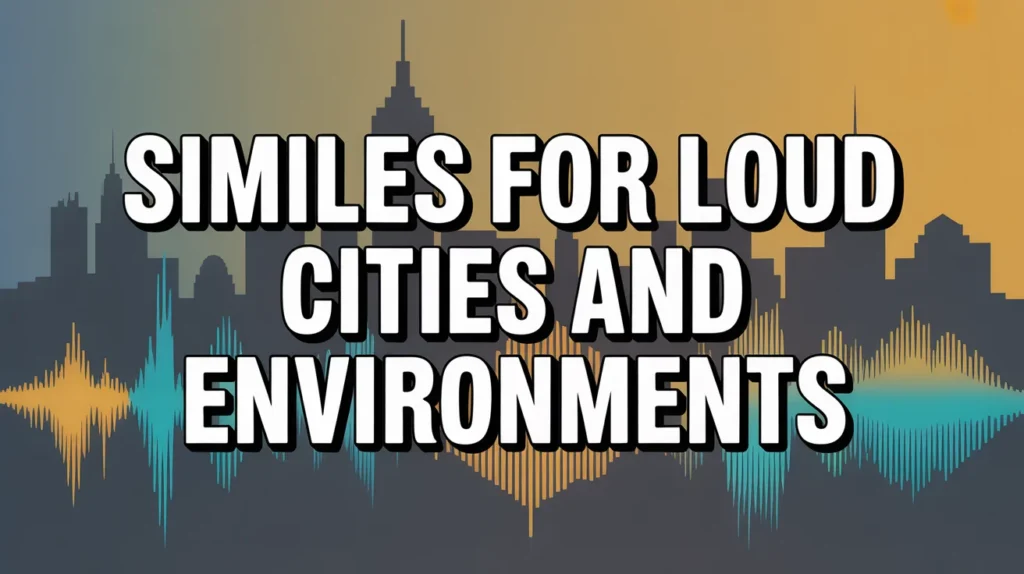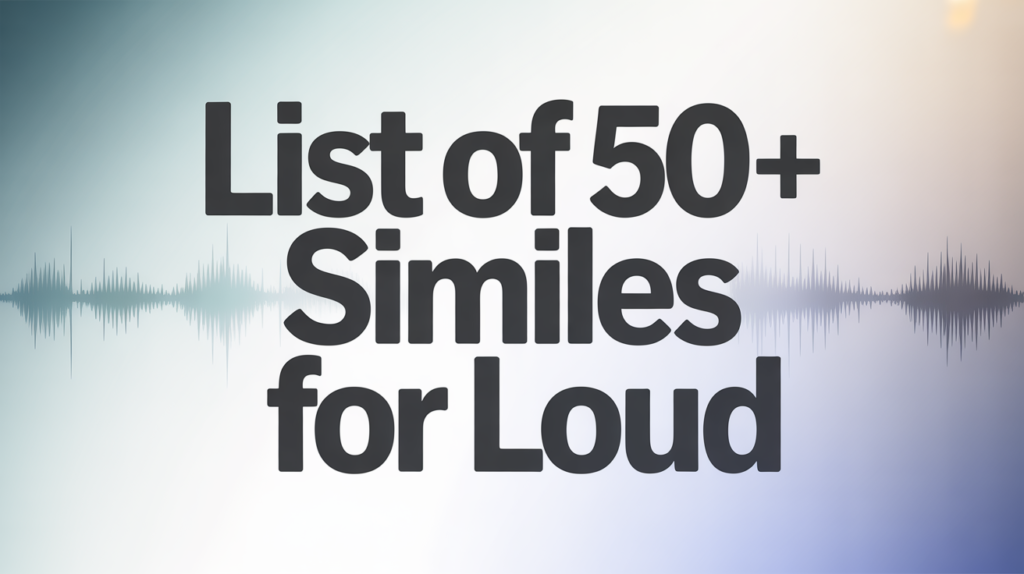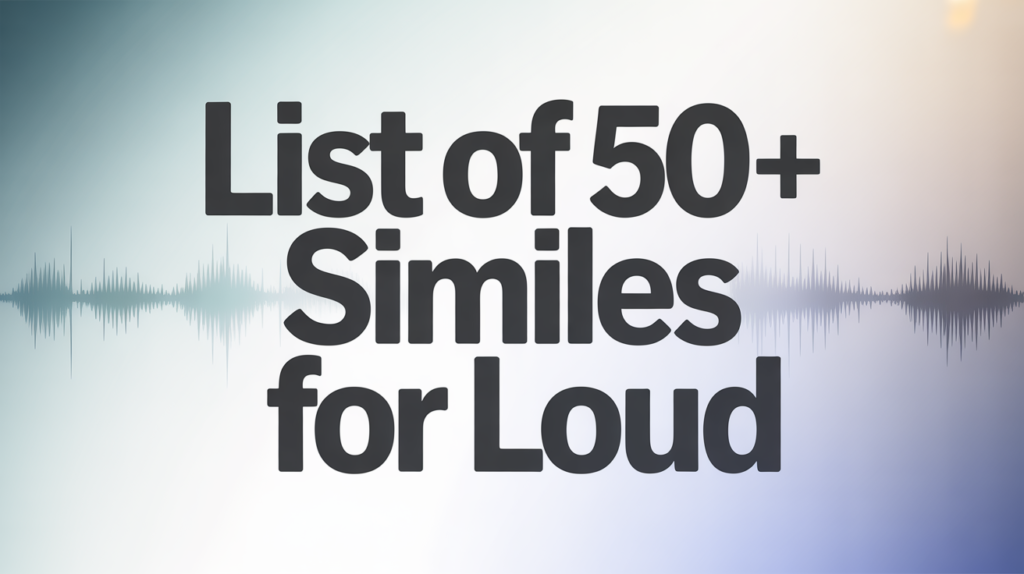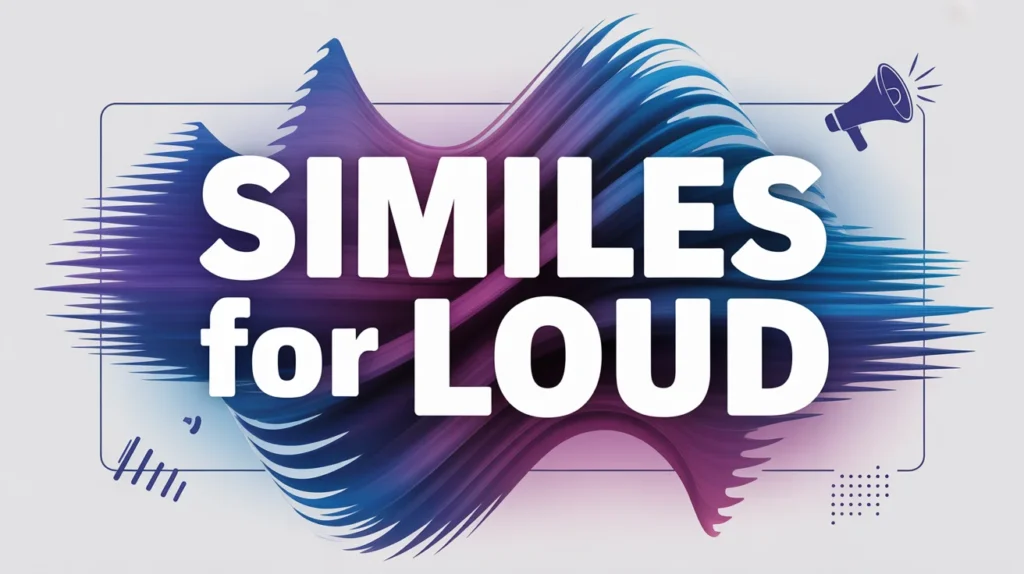Have you ever struggled to describe a sound that’s so loud it shakes your soul? That’s where similes for loud come in. Similes are one of the most powerful tools in descriptive writing — they help you compare a sound to something vivid, familiar, and memorable.
Whether you’re writing a story, poem, essay, or song, using the right simile for “loud” can transform your writing from ordinary to extraordinary. From “as loud as thunder” to “as noisy as a crowded marketplace,” these comparisons paint clear mental pictures for your readers.
In this guide, we’ll explore different similes for loud, understand their meanings, and learn how to use them effectively. You’ll also find examples, explanations, and tables to make your learning easier and more enjoyable.
What Are Similes for Loud?
A simile for loud is a comparison that describes how intense, powerful, or overwhelming a sound is by comparing it to something else known for its noise.
For example:
- “Her laughter was as loud as a jet engine.”
- “The crowd roared like thunder.”
Both sentences use similes to describe the degree of loudness by relating it to a strong, recognizable image.
Why Use Similes to Describe Loud Sounds?

Similes make your writing more vivid, emotional, and relatable. Instead of just saying something was “loud,” similes help readers hear the sound through imagination.
Benefits of Using Similes for Loud:
- Enhances imagery — Helps readers visualize and hear the scene.
- Adds emotional tone — The choice of simile conveys mood (joy, chaos, fear, etc.).
- Engages readers — Creative comparisons keep writing lively and interesting.
- Improves storytelling — Makes your descriptions more dynamic and realistic.
Common Similes for Loud
Let’s look at some of the most popular similes for loud with meanings and examples.
SimileMeaningExample SentenceAs loud as thunderExtremely noisyThe explosion was as loud as thunder in the mountains.As loud as a jet engineDeafening soundHis voice was as loud as a jet engine during the concert.Like a roaring lionFierce, dominating noiseThe crowd cheered like a roaring lion.As noisy as a marketplaceConstant chatter and chaosThe classroom was as noisy as a bustling marketplace.Like a crashing waveSudden and overwhelmingApplause erupted like a crashing wave.As loud as fireworksBursting, sharp noiseThe car backfired as loud as fireworks.Like a drumbeat in your headRepetitive and strongThe music pounded like a drumbeat in my head.As loud as a train whistlePiercing and unavoidableHer scream was as loud as a train whistle in the night.Like a storm ragingPowerful and uncontrollableThe argument grew like a storm raging outside.As loud as a sirenSharp and attention-grabbingHis alarm was as loud as a police siren.
Creative Similes for Loud Sounds
To make your writing stand out, use creative and uncommon similes that give fresh perspectives.
Examples:
- As loud as a volcano erupting – Suggests unstoppable, natural power.
- Like a cannon firing – Indicates explosive force.
- As loud as the sea in a storm – Reflects chaotic and wild energy.
- Like glass shattering in your ears – Implies discomfort and sharpness.
- As loud as an echo in a canyon – Adds a haunting, echoing feeling.
These kinds of similes not only describe sound but also express emotion and atmosphere, making your writing truly engaging.
Similes for Loud Laughter
Laughter can be joyful, obnoxious, or infectious — and similes help express these different tones.
SimileMeaningExampleAs loud as a hyenaWild and uncontrollableHe laughed as loud as a hyena at his own joke.Like thunderclapsPowerful and boomingHer laughter burst like thunderclaps across the room.As loud as a stadium crowdEnergetic and overwhelmingThe kids laughed as loud as a stadium full of fans.Like a siren wailingShrill and piercingHer laugh was like a siren wailing in the night.As loud as a brass bandJoyful and boldTheir laughter was as loud as a brass band parade.
Similes for Loud Music
Music often brings strong emotions — excitement, energy, or chaos. These similes capture the essence of loud music.
- As loud as a nightclub speaker – Suggests overpowering volume.
- Like thunder rolling across the sky – Evokes deep, rumbling bass.
- As loud as a festival crowd – Brings out the energy and fun.
- Like waves crashing against cliffs – Describes forceful sound waves.
- As loud as a storm breaking – Symbolizes chaos and passion.
💡 Pro Tip: When describing loud music, match your simile to the mood. For excitement, use “as loud as a celebration.” For irritation, try “as loud as an alarm clock at 5 a.m.”
Similes for Loud Arguments or Voices
Loudness can also represent tension, anger, or authority. These similes suit emotional or confrontational situations.
SimileToneExampleAs loud as a roaring firePassionate and heatedTheir debate was as loud as a roaring fire.Like thunder in a caveEchoing and intenseHis voice boomed like thunder in a cave.As loud as a battle cryFierce and determinedShe shouted as loud as a battle cry.Like a cannon explodingSudden and shockingHis anger erupted like a cannon exploding.As loud as a storm windChaotic and wildTheir argument was as loud as a storm wind.
Similes for Loud Cities and Environments

When describing urban life or crowded areas, loudness becomes a symbol of energy and movement.
Examples:
- As loud as rush hour in New York.
- Like a carnival in full swing.
- As noisy as a factory floor.
- Like a train station at dawn.
- As loud as construction at sunrise.
These similes vividly portray city chaos while adding depth to your scene.
How to Use Similes for Loud in Writing
1. Match Emotion to Sound
Each simile has an emotional tone. Choose one that fits your scene — excitement, fear, joy, or chaos. Example:
- Joyful: “The music was as loud as a celebration.”
- Scary: “The noise was like thunder chasing the hills.”
2. Avoid Overused Similes
While classics like “as loud as thunder” work well, try to mix in unique ones for freshness.
3. Use Sensory Language
Combine similes with sensory verbs to create immersive descriptions. Example:
- “The drums pounded like a thousand hearts beating in sync.”
4. Vary Sentence Length
Alternate short and long sentences to keep rhythm and readability smooth.
5. Don’t Overdo It
Similes add power, but using too many can overwhelm your reader. Use them strategically for impact.
List of 50+ Similes for Loud


Here’s a comprehensive list you can use for inspiration:
- As loud as thunder
- Like a jet engine
- As loud as fireworks
- Like a roaring lion
- As loud as an explosion
- Like a battle raging
- As loud as a stampede
- Like crashing cymbals
- As loud as a foghorn
- Like a bomb going off
- As loud as a waterfall
- Like a car alarm
- As loud as a thunderstorm
- Like drums in a parade
- As loud as cheering fans
- Like a storm at sea
- As loud as a lion’s roar
- Like a fire alarm
- As loud as cannon fire
- Like crashing waves
- As loud as an air raid siren
- Like clanging bells
- As loud as machinery
- Like breaking glass
- As loud as the ocean
- Like a marching band
- As loud as gunfire
- Like a trumpet blast
- As loud as a stadium crowd
- Like the wind howling
- As loud as laughter at a comedy club
- Like the crash of thunder
- As loud as a helicopter landing
- Like a hammer striking metal
- As loud as kids playing in recess
- Like a mountain echo
- As loud as applause after a show
- Like fireworks at midnight
- As loud as a parade passing by
- Like a storm breaking
- As loud as a roller coaster
- Like crashing metal
- As loud as chaos itself
Practical Examples in Sentences
- The thunder was as loud as an army marching overhead.
- Her voice was like a siren piercing through silence.
- The crowd cheered as loud as fireworks exploding in the night sky.
- The machinery roared like a beast awoken from slumber.
- The band played as loud as thunder rolling through the hills.
These examples show how similes add depth, imagery, and emotion to writing.
FAQs About Similes for Loud
1. What is a simile for loud?
A simile for loud compares a sound’s intensity to something familiar and powerful, such as “as loud as thunder” or “like a roaring lion.”
2. How can similes improve my writing?
Similes make your writing more vivid, emotional, and memorable by creating mental pictures for the reader.
3. Can I use similes for both positive and negative sounds?
Yes! For example:
- Positive: “As loud as a celebration.”
- Negative: “As loud as an alarm at midnight.”
4. What’s the difference between similes and metaphors?
A simile uses “like” or “as” for comparison (as loud as thunder), while a metaphor says something is something else (the thunder was a roaring beast).
5. How can I create my own simile for loud?
Think of things known for their volume — storms, crowds, machines — and connect them using “like” or “as.” Example: “As loud as the crowd in a final football match.”
Conclusion
Describing noise isn’t just about volume — it’s about feeling, imagery, and impact. The right simile for loud can transport readers into the moment, making them hear what you describe as if they were there.
Whether you choose “as loud as thunder” or “like fireworks in the sky,” similes bring your writing to life — giving it rhythm, color, and power.

Olivia Hayes is a digital writing consultant who specializes in grammar for online content. She believes that correct grammar enhances credibility and readability. On GrammerPro, Olivia shares easy-to-follow writing tips for bloggers and professionals alike.

